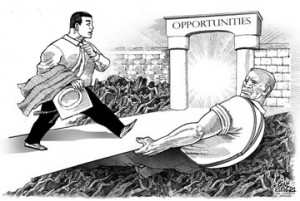Roadmap to success

UP Cebu’s graduation ceremonies was spiced up by a lightning protest by some graduates in black armbands who deplored school policy that bars students from taking exams without paying tuition, resulting in deaths like the suicide of UP-Manila student Kristel Tejada.
Education, however expensive it is as the years go by, is still highly valued by Filipino families, despite the existing climate that grants more opportunities to those with privilege, wealth and connections.
It’s important that both Cebu City Hall and the Capitol have their own scholarship programs to finance the education of poor but deserving students.
Education may not guarantee material wealth, but at the very least it can help achieve a better quality of life.
The reality in other parts of the world is that completing one’s education isn’t a 100 percent guarantee of material success. Just ask Mark Zuckerberg, Facebook founder who didn’t even complete his degree and Michael Dell of the famed Dell computer units.
Article continues after this advertisementSteve Jobs and Bill Gates didn’t complete their studies when they came out with Apple and DOS.
Article continues after this advertisementBut these innovation giants were the products of schools and universities with established reputations for producing students who can stand toe to toe with the rest of the world.
Then again, unlike them, our students or those wishing to pursue a similar career path like them, don’t have an environment that gives tools, let alone encourages and provides incentives for out-of-the-box creativity.
At the most, Cebu and the rest of the country are stuck with the pressure of alligning school curricula with industry needs to produce graduates who can immediately find jobs.
The pressure is especially felt in churning out graduates to fill seats in Business Process Outsourcing (BPO) offices geared for a global marketplace rather than employment in homegrown industries.
That’s the big picture of reality.
For something closer to home, local government units (LGUs) should create mechanisms and systems that provide people with alternative livelihood and employment opportunities in lieu of a minimum four-year course that would prove sustainable and benefit a greater portion of society—to forge or create one’s own roadmap to success.